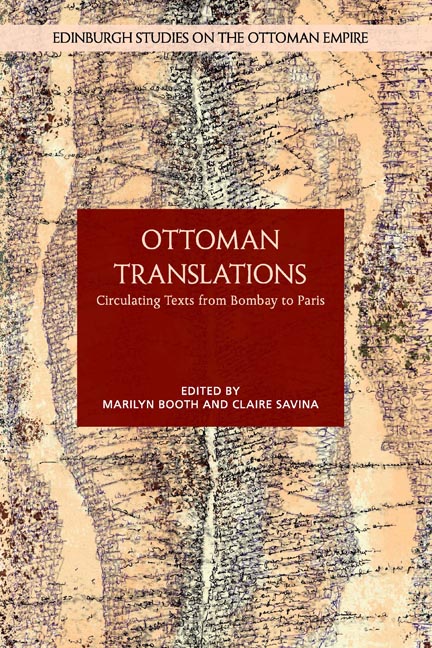Book contents
- Frontmatter
- Contents
- Note on Translation, Transliteration and Form
- Acknowledgements
- Notes on Contributors
- Introduction – Ottoman Central: Circulating Translations from the Indian Ocean to the Eastern Mediterranean and on to the Far West of Europe
- Part I Proliferating Classics
- Part II Mediterranean Multiples
- Part III Women In Translation
- Index
- Miscellaneous Endmatter
4 - Khayr al-Din al-Tunisi’s Muqaddima to Aqwam al-masalik fi ma‘rifat ahwal al-mamalik (The Surest Path to Knowing the Condition of Kingdoms), in Arabic, French and Ottoman
Published online by Cambridge University Press: 19 October 2023
- Frontmatter
- Contents
- Note on Translation, Transliteration and Form
- Acknowledgements
- Notes on Contributors
- Introduction – Ottoman Central: Circulating Translations from the Indian Ocean to the Eastern Mediterranean and on to the Far West of Europe
- Part I Proliferating Classics
- Part II Mediterranean Multiples
- Part III Women In Translation
- Index
- Miscellaneous Endmatter
Summary
PART I
Khayr al-Din al-Tunisi’s Aqwam al-masalik/Réformes nécessaires: A Dual Intervention in Arabic and French Political Discourses
Is the Muslim world now merely a set of dead nations, which ought to be, following a harsh but memorable saying, ‘quickly buried before they infect the living’ – or does it still contain elements of life, of regeneration, of futurity? Does it preserve enough latent forces that, in finally manifesting themselves through reforms, they can one day give it the right to claim its place and its role in the progressive movement of humanity?
Thus opened a long book review in the French Revue de l’instruction publique of 2 April 1868. For readers concerned with the fate of ‘the Muslim world’, the question so sonorously posed here might well have seemed a pressing one. The great Eurasian Muslim dynasties of the Mughals and the Qajars had fallen or dwindled, while the Ottoman Empire, Christendom’s historically formidable adversary, was derided in European capitals as ‘the sick man of Europe’. Several of its provinces, most dramatically perhaps Algeria from 1830, had succumbed to varying degrees of European control.
The author of the work under review, ‘M. le général Khérédine’, approached the issue somewhat more guardedly. ‘[E]very sensible Muslim’ must accept, his preface noted, that ‘the rapidity of communications’ was making the world resemble ‘a single country inhabited by different races, in ever more frequent contact with each other, having identical interests to satisfy, and contributing, albeit separately, to the common good’. He accepts realistically this initial fact of a world shrinking under the impetus of ‘the progressive movement of humanity’, or what we might call the global expansion of a Europe-centred capitalist system. His problem is not how to avoid integration into this new reality, but how best to manage its terms: he seeks to control the manner in which the spheres of Muslim world and outside world would be conjoined, where there would be compatibility and equivalence (‘identical interests’, ‘common good’), and where distinctiveness and separation. In this way, he sets out to argue that the Muslim world could indeed regenerate itself via reforms, and so join the nineteenth-century march of progress – and to suggest exactly what sort of reforms would be required.
- Type
- Chapter
- Information
- Ottoman TranslationCirculating Texts from Bombay to Paris, pp. 121 - 189Publisher: Edinburgh University PressPrint publication year: 2022



